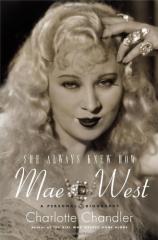She Always Knew How: Mae West - A Personal Biography
Review
She Always Knew How: Mae West - A Personal Biography
As Mae West herself once proclaimed, “Some women know how
to get what they want. Others don’t. I’ve always known
how.” This epigram explains the title as well as the mindset
of this very driven and singular woman. Charlotte Chandler,
venerated biographer of Alfred Hitchcock, Groucho Marx and, most
recently, Bette Davis, turns her keen eye to the life and career of
one of the most iconic stars of Hollywood.
Born Mary Jane West in Brooklyn, New York, in 1893, she quickly
found her calling, and it involved a stage, a spotlight and a
receptive audience. Mae, who changed her name only slightly from
the nickname of “May” for aesthetic reasons, was the
first child of Matilda and Jack West. Jack was known throughout New
York as “Battlin’ Jack,” a tough, no-nonsense
neighborhood boxer who once laid a guy flat with one punch for
merely looking at his young wife. Her parents wanted to give their
talented daughter all they could and encouraged her to perform on
the stage, which she did, with great success. She spent her
formative years in variety shows, vaudeville tours and the
burlesque circuit, literally growing up in front of her
audience.
When she came of age, Mae decided that instead of fitting a
rather voluptuous peg into a square hole, she would do far better
if she wrote her own material. Thus, Mae West the playwright was
born. Her first play, scandalously titled Sex, opened in
1926 and became something of a cause célèbre. Mae was
convicted of obscenity and sentenced to 10 days in jail. She could
have had her lawyer and soon-to-be lover persuade the
powers-that-be to knock the sentence down to community service, but
Mae felt it was more honorable to do her time --- and, of course,
think of the publicity!
Years later, she commented, “They say censorship was my
enemy, but I’m not so sure about that. Maybe censorship was
my best friend. You can’t get famous for breaking the rules
unless you’ve got some rules to break. Where would censorship
have been without me? Like I always say, I made censorship
necessary.” After that, there was no stopping her. Plays that
tackled very tough, very modern issues continued until Hollywood
came to call. There, as on Broadway, she called her own shots,
never afraid to push the envelope.
Not only did her trademark sayings like “Come up and see
me sometime” (which is actually a misquote from one of her
early films) and that one-of-a-kind walk define her persona, Mae
proved herself to be a rather acute arbiter of talent. She made
sure that Cary Grant was cast alongside her in I’m No
Angel, and she persuaded George Raft, a local tough she had
known in New York, to come to Los Angeles to pursue acting,
eventually becoming her leading man in Night After Night.
She was always about the work and took it most seriously. If W.C.
Fields turned up to the set of My Little Chickadee
inebriated, West would promptly leave. “Sex and work have
been the only two things in my life,” she once said,
“…but if I ever had to choose between sex and my work,
it was always my work I’d choose.”
But apart from the work and the men (amazingly, there were only
a few really important men in her life), Chandler also divulges
what a kind and generous woman Mae was --- always eager to sign an
autograph (she kept extra photos in the car, just for this
purpose), faithfully keeping up with her fan mail, answering most
letters herself, and generously donating to local charities in
need. Once, she donated her slightly used limousine to the local
convent because she couldn’t bear “to see a nun waiting
for the bus” and decided they need a little luxury, too.
Most of the stories in this book were culled from conversations
Chandler had with Mae at her Ravenswood apartment in Hollywood the
year before her death. Her recall is astounding, and her desire to
protect her image is unmistakable: “I made up my mind very
early that I would never love another person as much as I loved
myself. Maybe that sounds selfish to you. It is. But I saw what a
mess a lot of people could make of their lives when they are
smitten. Some of them go temporarily insane. They find a person who
they think holds the key to their happiness --- the only key to
their happiness that exists. They don’t understand
they’re the ones who give the other person that power.
It’s like a fever. The person in that condition may ruin
their own life, and the lives of others, as well.”
Both reader and author find it difficult to ascertain if Mae is
all about protecting the image she carefully created over so many
years, or if she really believes it. But with her trademark wit,
she retorts, “Some people thought I ought to see a
psychiatrist, but why spoil a good thing?”
Reviewed by Bronwyn Miller on January 23, 2011
She Always Knew How: Mae West - A Personal Biography
- Publication Date: February 10, 2009
- Genres: Biography, Nonfiction
- Hardcover: 336 pages
- Publisher: Simon & Schuster
- ISBN-10: 1416579095
- ISBN-13: 9781416579090










